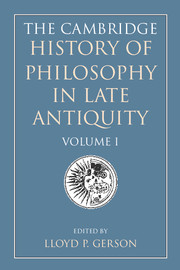Book contents
- Frontmatter
- General introduction
- I Philosophy in the later Roman Empire
- II The first encounter of Judaism and Christianity with ancient Greek philosophy
- III Plotinus and the new Platonism
- IV Philosophy in the age of Constantine
- V The second encounter of Christianity with ancient Greek philosophy
- Introduction to Part V
- 24 Basil of Caesarea
- 25 Gregory of Nyssa
- 26 Gregory of Nazianzus
- 27 Calcidius
- 28 Nemesius of Emesa
- 29 Synesius of Cyrene
- 30 Marius Victorinus
- 31 Augustine
- Map 1 The Byzantine Empire, c. 500
27 - Calcidius
from V - The second encounter of Christianity with ancient Greek philosophy
Published online by Cambridge University Press: 28 May 2011
- Frontmatter
- General introduction
- I Philosophy in the later Roman Empire
- II The first encounter of Judaism and Christianity with ancient Greek philosophy
- III Plotinus and the new Platonism
- IV Philosophy in the age of Constantine
- V The second encounter of Christianity with ancient Greek philosophy
- Introduction to Part V
- 24 Basil of Caesarea
- 25 Gregory of Nyssa
- 26 Gregory of Nazianzus
- 27 Calcidius
- 28 Nemesius of Emesa
- 29 Synesius of Cyrene
- 30 Marius Victorinus
- 31 Augustine
- Map 1 The Byzantine Empire, c. 500
Summary
LIFE AND WRITINGS
We know next to nothing about Calcidius, and besides a partial translation of and commentary on Plato’s Timaeus no other works are attributed to him. The translation preserved under his name renders Plato’s Timaeus up to 53c, the commentary starts only at 31c. His understanding of Greek is not flawless, and his Latin phraseology can be distinctly odd, but the latter feature can also be explained by the dominance of the Greek original. There is a possibility that the commentary as we have it is not complete. In the less well-known second edition of this work (1975; the first dates from 1962), Waszink concedes (clxxxvi) that in the case of terminological similarities between Calcidius and other Latin writers, such as Ambrose, Calcidius could well have been the source, in contrast to his earlier claim. With this concession, and given the notorious fluidity of metrical clausulae for dating purposes, the investigation into Calcidius’ Latinity is reopened, together with the possibility that he may belong, after all, with the first half of the fourth century ce. This would bring the account closer in date to Iamblichus, with whom Platonism took a decisive turn apparently ignored by Calcidius, or the Christian Origen (who died c. 254), rather than place it late in the fourth century or even in the early fifth, as Waszink has done.
It has generally been assumed that Calcidius is a Christian. What we can say for certain is that his addressee appears to be a Christian (chs. 126, 133), and so Calcidius could be making some concessions to his patron. That this Osius would have been the bishop of Cordoba is a matter of conjecture. Calcidius’ localized concessions to Christian views have little influence on the commentary as a whole. His material from ‘the Hebrews’, which he does not always accept uncritically (chs. 219, 276, 278), appears to be merely integrated into his doxographical overviews, as one stance among others.
- Type
- Chapter
- Information
- The Cambridge History of Philosophy in Late Antiquity , pp. 498 - 508Publisher: Cambridge University PressPrint publication year: 2000



